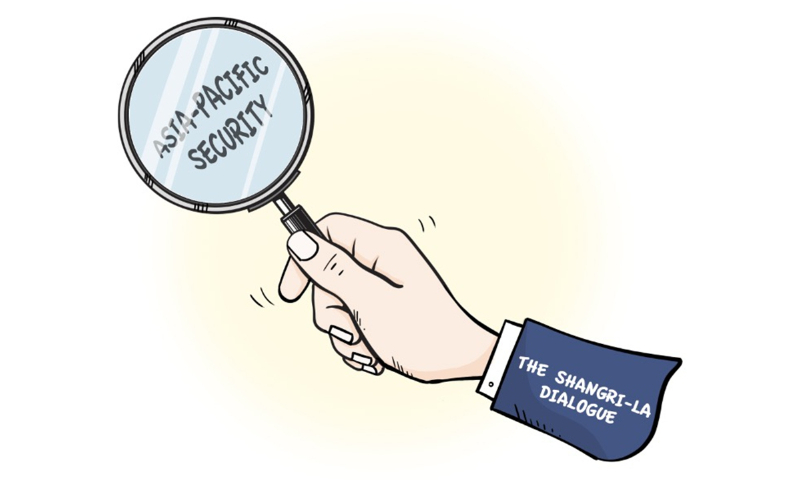
Illustration: Chen Xia/GT
The 20th Shangri-La Dialogue will be held from Friday to Sunday in Singapore. According to reports, nearly 600 delegates from 49 countries and regions, including the defense chiefs of China and the US, will attend the conference. Against the backdrop of the ongoing Russia-Ukraine conflict and the complicated situation in the Asia-Pacific region, the importance of the Shangri-La Dialogue, as a multilateral security cooperation mechanism established in the Asia-Pacific region after the 9/11 attacks, has been constantly raised, attracting great attention from all parties involved.
We hope that the Shangri-La Dialogue can truly play a role in bridging differences, increasing mutual trust, and genuinely promoting the improvement of the regional security environment, rather than providing a platform for meaningless attacks or disputes. Europe is deeply mired in crisis and division, and the Asia-Pacific region is also facing significant risks of a more daunting security situation and even turmoil and war. The growing concerns have also spread to the venue of the Shangri-La Dialogue. We look forward to hearing more constructive and positive voices from the Shangri-La Dialogue. The attendance of the Chinese Defense Minister is intended to voice China's positions and demonstrate its responsibilities as a major country.
Frankly speaking, the outcome and effectiveness of the Shangri-La Dialogue largely depend on how the US behaves during the conference. Looking at previous dialogues, it is evident that the US has always tried to take center stage and set the tone for the Shangri-La Dialogue. The US, together with several of its petty followers, promotes its own set of security strategies, which have been proven to be highly destructive, while accusing and smearing countries it regards as rivals or enemies. Their primary target has been China in recent years. This has consistently heightened the tension at the Shangri-La Dialogue and even made Chinese society see it as a "treacherous trap."
However, the US has become increasingly powerless at the Shangri-La Dialogue and it garners more doubt than support. The fundamental reason is that its proposals and actions are becoming increasingly unpopular in the international community, causing concern rather than endorsement. Representatives from more developing countries have expressed positions at the Shangri-La Dialogue that differ significantly from those of the US and the West. This is not about confronting the US but is a natural outcome driven by the tide of multilateralism.
When the voices at the Shangri-La Dialogue become more diverse, transforming it from the domain of the US and the West into a more representative and broadly inclusive multilateral security forum, its value will be significantly enhanced. But it is clear that the US does not want to go along with this trend.
We strongly urge US Secretary of Defense Lloyd Austin not to repeat clichés or focus solely on blaming others and shirking responsibility at the Shangri-La Dialogue. Instead, he should offer some new ideas, perspectives, and solutions to the various serious security issues in the Asia-Pacific region. In short, he should demonstrate a positive attitude and sincerity in promoting openness, inclusiveness, peace, and stability in the region, rather than forming cliques as well as creating factions and divisions in the opposite direction at the Shangri-La Dialogue. Everyone knows the true intentions of the US.
The US is now making an issue of China's refusal to a meeting between the Chinese Defense Minister and the US Defense Secretary during the Shangri-La Dialogue. China has already emphasized many times why it refused, and the US is deliberately making a fuss. China does not want to engage in staged exchanges for show, nor can it accept coercive exchanges without sincerity under sanctions and provocations. If the US really wants to know China's views, it should listen carefully to the speech by Chinese State Councilor and Defense Minister Li Shangfu at the Shangri-La Dialogue and bear what he says in mind. Li's speech will definitely contain more substantive content than Austin's.
The day before the Shangri-La Dialogue kicks off, Li arrived in Singapore and met with Singapore's Defense Minister Ng Eng Hen. The two sides witnessed the signing of a Memorandum of Understanding on the Establishment of a Secure Defense Telephone Link. Such communication, dialogue, and mutual trust are the original intention of China's participation in the Shangri-La Dialogue, as well as the purpose of most participant countries in the Asia-Pacific region. It's reported that Li will deliver a speech on "China's new security initiative," from which we can feel China's sincerity, goodwill, and responsible attitude. China advocates a new path to security featuring dialogue over confrontation, partnership over alliance and win-win over zero-sum, and hopes to receive a positive response from the US.
The attendance of the Chinese Defense Minister in the Shangri-La Dialogue itself is a reflection of the PLA's open attitude toward the outside world. The PLA is willing to communicate with all peaceful and friendly forces, deepen military cooperation with various countries, and make greater contributions to regional and world peace and stability, including the US and the US military, provided that the US military shows sincerity and goodwill for peace. The Shangri-La Dialogue is actually an opportunity.




